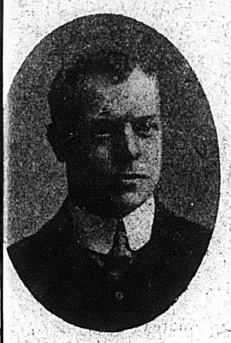November 9, 1907
At one period of Liverpool’s career their eleven might accurately have been dubbed the “team of all the Macs.” Gradually the sons of Scotia have been substituted by English born players, and a week ago at Bristol the Anfielders were represented by eleven Englishmen. One of the most recent additions to the premier ranks is the subject of our present sketch, and as he is a local product, more than ordinary interest has been centred in his doings since he joined the Leaguers. It is to the junior teams in and around Liverpool that our two big club will have to look for their future players, and numerous examples can be cited of the wisdom of such a policy.
Harry Fitzpatrick was born in Everton, and he was educated at St. Francis Xavier’s School. He remained there a little longer than four years, and during the later stages of this period he played with the school team. His father was then the Bootle goalkeeper, and naturally enough “Fitz,” fils was anxious to emulate his father’s example. It was therefore as a custodian he started his football career, but in one match he was asked to play out, and figured in the half back line. So well did he shape there that he was retained in the position, and never again assumed the role as goalkeeper.
After leaving school he joined a club knows as Everton juniors, and for one season played centre half back with them. In a junior match against Garston Gas Works Reserves he scored three goals, and the following winter he was found in their ranks. For three years he remained attached to the South End organisation, and was given the regular position of inside left, which rapidly became his favourite post. During his stay there the Works won the Championship of the Liverpool and District Amateur Alliance, and also reached the final round of the Liverpool Junior Cup.
When about twenty years of age, Fitzpatrick joined the Army, and was attached to the Gordon Highlanders, who at different intervals were stationed at Aberdeen, Glasgow, and Cork. Here he passed three eventful years of his life, and for two seasons he acted as captain of the Regimental team. Many honours fell to the Gordons, and it was as inside right or left that our subject usually performed in the eleven. When at Cork his Regiment carried off the 8th Division Cup, the Munster Cup, and a couple of Shields, while they also participated in the Irish and English Army competitions.
After a sojourn of three years “Fitz,” was bough out of the service, and he came in touch with the Everton Directors who, however, at that time, were not very keen for business in the matter. His father when at Bootle was very friendly with Jimmy “Punch” McEwen, who was also a North End favourite, but who, at the time we are now quoting had migrated to Luton.
On hearing of Fitzpatrick’s return home, he immediately made overtures to him to go to the straw plaiting town, and thus our subject left Liverpool for another twelve months. With the Southern Leaguers he played inside left, inside right, and centre-half-back, occupying the latter position in an English Cup Tie against Gainsborough. He only remained in Bedfordshire a season, when he was secured by the Anfielders, with whom he is now making himself very popular.
Fitzpatrick has a capital idea of the position he occupies in the forward line, but there are one or two weaknesses in his play which League experience should quickly eradicate. We refer to his mode of gathering the ball, and not exercising sufficient discrimination in parting with it. This we attribute mostly to over anxiety, and therefore consider that an extended trial will rectify the failings. We admire his notion of placing the ball forward and on the ground; this is the only sort of football that will produce good results and we should like to see the Anfielders adopt such tactics in every department of their team.
Fitzpatrick is an ardent lover of sport in all its branches, and now though almost solely occupied with football, he formerly when with the Army, participated in hockey, swimming – a past time still indulged in – gymnastic work, and indeed anything appealing to the heart of an athlete. He has justified his promotion to the first team at Anfield, and we have not yet seen him approaching his best. That he will develop into a useful League player seems more than probable, and we hope to see him retain his present position for many months to come. He stands 5ft. 8in., and weighs 11st. 12lbs., and his general demeanor on the field is in itself suggestive of the beneficial effects produced by the consistent drill exercises which the military man has to undergo.
Harry Fitzpatrick.

(Joint Everton & Liverpool Programme: November 9, 1907)
